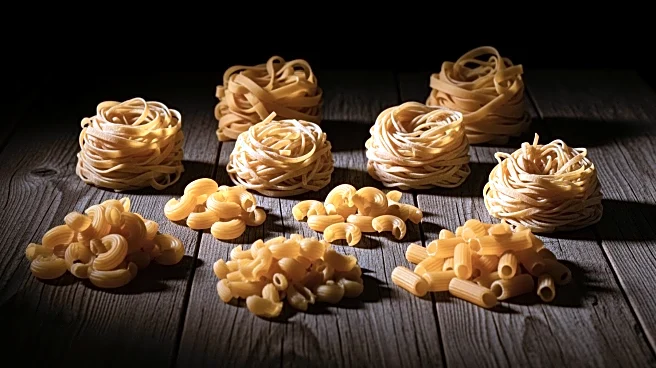What's Happening?
President Trump's tariffs are impacting Italy's largest pasta exporters, potentially leading to a shortage of Italian pasta on U.S. grocery store shelves. The tariffs, part of broader trade measures, are designed
to protect American industries but have unintended consequences for consumers who enjoy imported goods. Italian pasta, a staple in many American households, could become less accessible and more expensive as a result of these tariffs. The report highlights the economic strain on Italian exporters and the ripple effects on U.S. consumers who may have to seek alternatives or pay higher prices for their favorite pasta products.
Why It's Important?
The imposition of tariffs by President Trump is significant as it affects international trade relations and consumer choices in the U.S. While intended to bolster domestic production, these tariffs can lead to increased prices for imported goods, affecting consumer spending and potentially altering market dynamics. The pasta industry, both in Italy and the U.S., faces challenges as supply chains are disrupted. American consumers, accustomed to a variety of pasta options, may experience limited choices and higher costs, impacting household budgets and dining habits. This situation underscores the complex interplay between trade policies and everyday consumer experiences.
What's Next?
If the tariffs persist, Italian pasta exporters may need to explore alternative markets or adjust their pricing strategies to remain competitive. U.S. retailers might seek domestic pasta producers to fill the gap, potentially boosting local production but also requiring adjustments in taste and quality preferences among consumers. Political leaders and trade organizations may engage in negotiations to address these trade barriers, aiming to balance protectionist policies with consumer interests. The ongoing dialogue between the U.S. and Italy could lead to revisions in tariff policies, impacting future trade agreements and economic relations.
Beyond the Headlines
The tariff situation raises broader questions about the impact of protectionist policies on global trade and cultural exchange. Italian pasta is not just a commodity; it represents a cultural connection between Italy and the U.S. The potential reduction in its availability highlights how trade policies can affect cultural diversity and consumer access to international products. This development may prompt discussions on the ethical implications of trade barriers and their role in shaping cultural consumption patterns.









